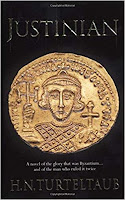 |
| Click for more info. |
Unfortunately, I didn't. The reasons for this are several. First, I couldn't find a single sympathetic character in the entire book. Justinian II is presented as a loathsome monomaniac. His faithful companion Myakes, whose conversations with a monk named Elpidios punctuate the narrative, is a lackey who excuses the emperor's excesses and in general plays the part of a lecherous old man. The aforementioned Elpidios is presented as a hypocrite. The lesser characters are all similarly presented with nary a good or honorable motive among any of them. This lack of virtuous characters is a hallmark of much modern fiction and I'd like to say here and now that I *hate* it. Such works are every bit as obnoxious as the saccharine tales of heroism and good hygiene that used to dominate the genre of historical fiction. As Aristotle said, we should aim for the golden mean, but as doing this can prove difficult, we should err on the side of the lesser vice. In Justinian, Turtletaub has chosen to err on the side of the greater.
That said, Turtletaub (or Turtledove, if we drop the pretense) certainly knows his history. Having translated the Chronicle of Theophanes, a Greek primary source which provides much of what we know about the 7th and 8th century in Byzantium, Turtledove's academic qualifications are not to be despised. However, having read his translation of Theophanes, I have a good idea of how he 'enhanced' the Justinian story for modern readers, and to me, that says a lot about what the author thinks of his potential readers and his misanthropic view of mankind in general. It's not a pretty picture.
Perhaps the most dismaying thing about this book is that it is completely unsuited for young readers. I love reading historical fiction with my kids, and there's precious little on Byzantium available for this purpose. But the copious graphic sex scenes, underage sex scenes, rape scenes, etc. in Justinian make the book completely anathema from this perspective. Indeed, I felt at times that someone had pasted some passages from "Penthouse Letters" into the book.
Turtletaub also treats religious figures shabbily, invariably making them either liars, weirdos, hypocrites, weaklings, or stooges--as if religion is always the mark of the scoundrel. And, of course, the supreme villain, Justinian himself, is presented as something of a religious fanatic, believing that God guides and approves his every wicked action. Here again Turltetaub hews closely to the modern secular conventional wisdom that becomes increasingly trite with each passing day.
So in short, unless you are looking for a depressing read that will leave you feeling like you need a shower and a visit to the confessional after you read it, I'd look elsewhere for an enjoyable novel about Byzantium.

No comments:
Post a Comment